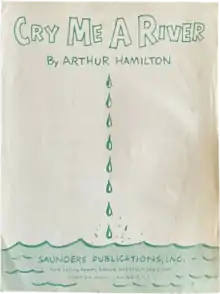Cry Me a River (Arthur Hamilton song)
"Cry Me a River" is a popular American torch song, written by Arthur Hamilton, first published in 1953 and made famous in 1955 with the version by Julie London.
| "Cry Me a River" | |
|---|---|
 One of 1950s sheet musics | |
| Song | |
| Published | 1953 |
| Songwriter(s) | Arthur Hamilton |
Origins and early recordings
Arthur Hamilton later said of the song: "I had never heard the phrase. I just liked the combination of words... Instead of 'Eat your heart out' or 'I'll get even with you,' it sounded like a good, smart retort to somebody who had hurt your feelings or broken your heart." He was initially concerned that listeners would hear a reference to the Crimea, rather than "..cry me a...", but said that "..sitting down and playing the melody and coming up with lyrics made it a nonissue."[1]
A bluesy jazz ballad, "Cry Me a River" was originally written for Ella Fitzgerald to sing in the 1920s-set film, Pete Kelly's Blues (released 1955). According to Hamilton, he and Julie London had been high school classmates, and she contacted him on behalf of her husband, Jack Webb, who was the film's director and was looking for new songs for its soundtrack.[2] After the song was dropped from the film, Fitzgerald first released her version on Clap Hands, Here Comes Charlie! in 1961. The song was also offered to Peggy King, but Columbia Records A&R chief Mitch Miller objected to the word "plebeian" in the lyric.[3][4]
The song's first release was by actress and singer Julie London on Liberty Records in 1955, backed by Barney Kessel on guitar and Ray Leatherwood on bass.[5] London had been urged to record the song by Bobby Troup, her future husband following her divorce from Webb.[2] A performance of the song by London in the 1956 film The Girl Can't Help It helped to make it a bestseller (reaching no. 9 on US and no. 22 on UK charts). It became a gold record, and in 2016, it was inducted by the Library of Congress in the National Recording Registry.[6]
Notable recordings
One site, Secondhand Songs, lists 484 recorded versions of the song (as at March 2020).[7] Versions that charted include:
- Marie Knight (1969) #35 on Billboard R&B[8]
- Joe Cocker (live version) (1970) #11 on Billboard [9]
- Mari Wilson (1983) #27 on UK Singles Chart[10]
- Denise Welch (1995) #23 on UK Singles Chart[10]
- Michael Bublé (2009) #34 on UK Singles Chart[10]
Use in media
- The song is featured on the soundtrack of the film V For Vendetta (2006).
- It was sampled in the song Kiss Kiss Bang Bang on the 2007 Tough Guys Don't Dance album by High Contrast.
- Bublé's adaption of the song was used in the BBC's advertising for, and theme music for coverage of the 2010 Winter Olympics.
- The song is featured on the soundtrack of the film Repo Men (2010).
- The song is mentioned in Bob Dylan's Murder Most Foul (2020).
References
- John Berlau, "Crying a River for Years", The Wall Street Journal, December 15, 2010. Retrieved January 14, 2016
- "How London Found Path To "River"", Billboard, 11 November 2000, p.45
- "PEGGY KING & ANDY KAHN - "Cry Me A River" at Metropolitan Room NYC 2-23-14". YouTube. Retrieved 4 October 2014.
- Lang, Joe (June 2014). "Caught in the Act" (PDF). Jersey Jazz. 42 (6): 46. Retrieved 28 July 2019.
- Cary O'Dell, "“Cry Me a River”—Julie London (1955)", Library of Congress. Retrieved March 7, 2020
- "National Recording Registry Recognizes "Mack the Knife," Motown and Mahler". loc.gov.
- "Cry Me a River", Secondhand Songs. Retrieved 7 March 2020
- Whitburn, Joel (1996). Top R&B/Hip-Hop Singles: 1942-1995. Record Research. p. 253. ISBN 0-89820-115-2.
- https://www.billboard.com/music/joe-cocker/chart-history
- "Cry Me a River". Official Charts Company.